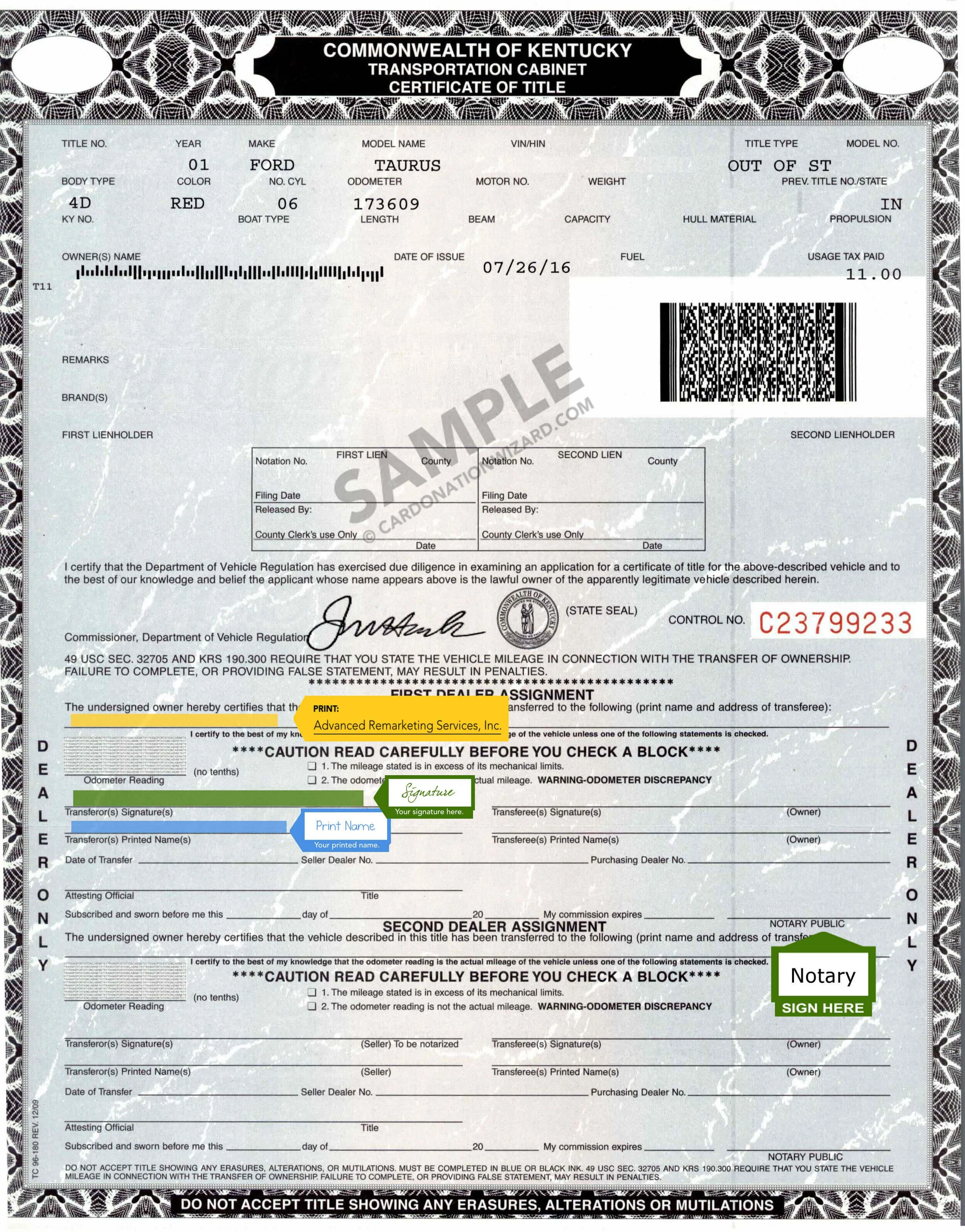The certificate of title, or car title, is unique to the United States and each state has their own title process. This legal form establishes the ownership over a vehicle. In most states, the title is issued by the Department of Motor Vehicles. But what do all the different title brands and title statuses mean? What is a salvage title, how is that different from a junk title, and what are the other title types? When were the first car titles issued?
Time to find out.
The First Car Titles Were Very Different
First, a little history lesson. You won’t find clear-cut answers on when the first car titles were issued. That’s because each state has their own process and each started making it part of their practice at different times.
For example, the first car titles in New York weren’t issued until 1973. Prior to that, all the buyer got was a registration that was signed and handed over during a sale.
In the state of New Jersey, they began issuing a state record of ownership in 1931. At first, they called it the “Original Bill of Sale.” It was issued from the seller of the car and filed with the NJ Division of Motor Vehicles. Eventually, this was replaced with a Certificate of Ownership. This eventually evolved into the New Jersey car title we see today.
You might have heard the term “pink slip” as a reference for car titles before. That’s because in California before 1988, the titles were actually pink. Now, they feature broad vertical strips of pink, yellow and teal with a green border.
Today, Car Titles are Different in Every State
While every state has their own practices, there is no uniform standard for car title formatting in the United States. Most titles include the same basic information. Most often, you’ll find these items on a car title:
Name and address of the registered owner
License plate number
Basic identifying information like the VIN (Vehicle Identification Number), year and make
Basic technical information like the Gross Vehicle Weight Rating
Critical information may be missing from the paper title. If there is a title lien, the lienholder isn’t always listed on the title itself. Also, some states don’t issue titles at all for vehicles past a certain age. That’s why it’s critical to perform a VIN Check or more detail when buying a car.
Common Kinds of Car Titles
Throughout the history of car titles, many kinds and styles have been issued. It’s vital that you understand what the basic title brands mean so you know what you are getting into during the purchase of your next vehicle. Let’s touch on each type briefly.
Clean or Clear Title
This is when the title is issued to an owner and there are no liens associated with it and none of the derogatory title brands below have ever been applied to this vehicle. Ideally, it’s what you want to see when you purchase a car and it all but guarantees a higher sale price than an identical car with derogatory title branding.
Salvage Title
If the vehicle experienced significant damage and insurance got involved, it might receive a salvage title. This is typically determined by the insurance company and often is a permanent branding cannot be removed or made clean ever again. Reconstructing the vehicle is expensive and complex, but it can be done and Rebuilt Title will be issued at that time. That still doesn’t make the title clean again – in fact, nothing will.
Reconstructed Title, Rebuilt Title, or Prior Salvage Title
If a vehicle has been rebuilt and state-inspected to verify the repairs, the DMV might issue a Rebuilt or Reconstructed title. This proves the car is safe for road use, but it also means it once wasn’t. It’s a permanent telltale that the car was most likely involved in a serious accident and deemed a total loss by an insurance company!
Certificate of Destruction
No, this isn’t the latest Megadeth album. If an insurance company pays out a claim and takes ownership of the vehicle, they might process the title with an attached Certificate of Destruction. In these situations, the car needs to be destroyed and won’t ever be allowed on the road again. There are rare cases when a vehicle could ever receive a title after this.
What’s tricky is seeing a vehicle that appears to be in acceptable condition but has been issued a Certificate of Destruction. Often, the damage goes beyond what you can see. For example, if the airbags received damage or the frame became weakened, or there was extensive water damage.
In these cases, the insurance company doesn’t want the liability of having someone drive the car. If something were to happen during an accident because of these defects, the insurance company would be liable. At this point, the only logical thing to do is sell the car for scrap or parts.
Junk Title
A junk title may be issued when a car is sold to a junkyard or dismantler. It differs from a salvage title because the vehicle cannot legally be returned to road use ever again. This is the brand of death for any car that receives it.
Parts Only
While this isn’t often found on the title, you will see it on a transfer form or bill of sale when the owner can’t find the title or the title has issues. The trouble with this is that some states will then process the “parts only” car for a salvage title when it comes across their desk. Ask the seller to specify whether the car’s title has been labeled Parts Only or if they think the car is only good for parts.
Flood Damage
Some states will issue specific branding for flood damaged vehicles. Scammers get pretty creative these days. For example, a common scam known as Title Washing involves moving a flood branded title to a state that doesn’t use that brand. This makes the brand disappear from the physical title, meaning that a prospective new owner won’t see it unless they run a detailed VIN check.
Bonded Title
When you can’t transfer a title because you can’t prove ownership, a bonded title may be a good option. You purchase a bond to cover the value of the vehicle in case another person claims ownership down the road. This is common with auctioned vehicles, estate sales, and cars that were left on a property that has since been resold.
A bonded title typically retains its status for three to five years. This is a more expensive way to title a vehicle and is considered a last resort when a clear title is impossible to obtain. And again, the resulting title will retain its original branding – a bonded title isn’t a clean slate.
Affidavit Title
If documentation is missing, the title might be issued under an affidavit.
Electronic Title
Many states are now on-board with issuing paperless or electronic titles. They will also grant an actual title if you need one for loan processing or transfer.
Title Lien
In the event of a title lien, commonly a result of a car title loan, the lienholder receives the title directly. It still has the purchaser listed as the owner, but they don’t get the title itself until the loan is paid off. In most cases, the lender retains possession until all debts are clear and the lienholder will usually be listed right on the title. But not always – run a VIN Check to be sure.
Import Title
A vehicle cannot be imported into the United States without a legal title which clears customs – not even from Canada or Mexico. Unless the vehicle was previously titled in the United States, you have to undergo extensive certifications to ensure the car is roadworthy before you enter the country.
Export Title
When a vehicle is exported, it receives documentation for clearance through customs. If it isn’t declared correctly, the owner might face trouble getting a clear title at their destination. Anyone looking to export a vehicle will want to begin this process early. Otherwise, you might encounter port storage fees as you wait for the correct documents.
Have Car Title Problems? We Can Help.
We hope this brief history of car titles and explanation of common title brands was helpful. If you still have questions, we are here to help. At Dirt Legal, we have helped drivers just like you deal with all sorts of car title situations. We are experts in the field and know the process of getting you what you want. If you need assistance obtaining a car title, you can count on us to provide reliable, fast service.
We offer VIN Checks and Vehicle Accident Reports to give you peace of mind when buying a car. We also offer title replacement for cars, motorcycles, and almost anything with wheels. Click the links to learn more about our services.
We are not attorneys. This article is not legal advice. Cover image source















Despite the rumors, there is no way to make a salvage title clean again. Scammers can make titles appear to be clean by obtaining an illegal title. Run a VIN check or vehicle history report to make sure the title is clean.